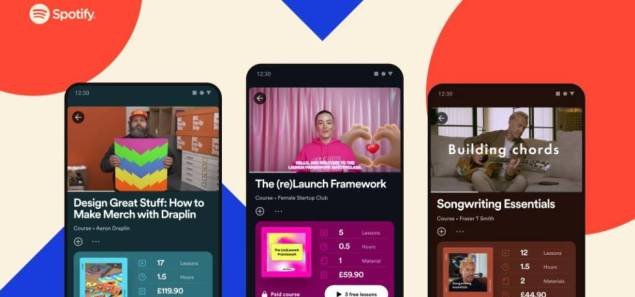It has made a name for itself in the music streaming, radio entertainment, and audiobook business. Spotify is adding e-learning as a new type of material to its platform in order to get its more than 600 million users to spend more time and money there.
Starting with a test run in the U.K., Spotify is looking into the possibility of giving free and paid video courses for education online. Because it was made with help from outside groups like the BBC and Skillshare, at least two lessons will be free. The average price of the whole course is between £20 and £80. At least for now, the prices will not change based on whether you are a basic or top user.
In an interview, Mohit Jitani, the product director for the education business in London, said that having pricing options is part of what they are trying before they think about how to make it available to more people. His words, “With this launch, we’re trying to understand the demand first,” were clear. “Then we figure out the best way to make it more interesting and captivating.”
The content can be found in both the home and explore tabs of Spotify (under “Courses”). It can be accessed on the web and through the Spotify mobile app.
The courses are like a mix of YouTube, Master Class, and LinkedIn Learning. The videos cover a lot of different topics, from making music to learning how to use Excel. There are also lessons on how to make online learning lessons for musicians and other people, which means they can become “education creators.”
There are a lot of online learning sites these days, which isn’t a surprise since the market was worth more than $315 billion in 2023. Some of them have been the first to use interactive content and other media formats. If you Google the phrase “Spotify for education,” you can even find a number of startups that want to be that. Spotify’s educational push is focused on one-way, on-demand video.
It looks like some classes have extra material, but it’s mostly extra documents and not tests or other ways to connect with the class. It was not clear from Jitani if Spotify would add any kind of engagement or game-like features in the future or if any kind of games are already on its plans.
The first companies to work with Courses are Skillshare (for creatives), PLAYvirtuoso (for music industry courses), BBC Maestro (like a Master Class), and Thinkific (for people who want to turn their own skills into online classes).
Jitani said that Spotify would like to choose which courses to offer based on what people are already searching for and listening to on the site. But it looks like there’s no end. If you look through the catalogs of these different providers, you’ll see that the topics cover a lot of ground.
Jitani said, “We’ll find out a lot about what people are interested in, and we’ll start getting a lot of segments around that.” “After that, we’ll find… the best content.”
The videos are owned by outside publishers who have given Spotify a license to use them. However, Spotify will store and sell the videos. The author, the publisher, and Spotify will all get a cut of the sales. Content partners will be in charge of paying the creators.
It’s not clear from Spotify what kind of cut will go to whom or if it will offer any kind of discount or other benefit to people who already pay for a premium account on the site.
Why Go To School? Why Choose The UK?
Spotify’s move shows that the company wants to keep expanding its business and find a way to make more money and create bigger profit margins. As Jitani put it, the U.K. was chosen because it’s a big market for the business and one of the busiest in the world.
Spotify’s finances are still going through a lot of ups and downs in this market. It laid off three times last year, and over the years it has been losing money more than making money. In its most recent quarterly earnings report in February, it showed a net loss of $81 million.
It might seem like a stretch for a company that is still best known for streaming music to get involved in the dry fields of online learning and professional development, but there are three areas where it makes sense.
Spotify is collecting a lot of information about what people do on its platform as its podcasting business continues to grow. It has found a strong link between some of its most popular podcasts and educational material.
A little over half of Spotify Premium users have listened to podcasts with educational or self-help themes, the company says. Cross-promotion is something that Spotify can do with the same suggestion surfacing that it does for music and podcasts. Think of a show where a “business guru” talks about a paid course with that person. Spotify is betting that one will help sell the other.
Along with this, Spotify has been working for a long time on tools for artists that will help them keep track of their earnings and make more of them. That fits with giving away educational material about how to run a business or make better music.
And finally, there is the video part. It’s been about ten years since Spotify first tried to get into video.
That hasn’t yet made them a competitor to Netflix or YouTube. The only time video came up in the company’s most recent earnings call was when CEO Daniel Ek said that video podcasting was “growing in a healthy way.” Some markets got music videos earlier this month, though, and now there’s a real push for educational films. It might still find its groove.
What do you say about this story? Visit Parhlo World For more.


